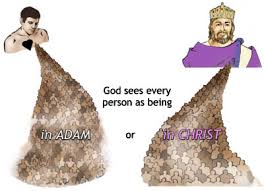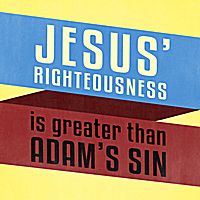Romans 5:18-19 can seem like a tricky passage. (18 Therefore as one trespass led to condemnation for all men, so one act of righteousness leads to justification and life for all men. 19 For as by the one man’s disobedience the many were made sinners, so by the one man’s obedience the many will be made righteous.) When one is reading it, it seems to have contradicting ideas if not read carefully and with context in mind. As always, context is king. In this passage Jesus and Adam are contrasted as types of each other and each one’s actions bear a consequence, one good and one bad (this is a major understatement). 🙂
 *cheesy photo perhaps, but this is the picture that Scripture seem to paint.
*cheesy photo perhaps, but this is the picture that Scripture seem to paint.
The passage from verses 12-21 of chapter 5 (just to gain a bit of context) begins by stating that sin came into the world and therefore death followed, because of one man, Adam. The entire human race, every single person who would live after Adam is counted as having sinned with him. The one command God gave was broken, and even though there was no law given, sin and death still reigned because death is the result of sin and everyone dies. There is no escape from physical death for anyone. So even though people may not have been disobeying direct commands of God before the law was given, they were still sinning, just not in the sense of disobeying a direct command like Adam did.
Then comes Christ. Christ’s act of a lifetime of perfect obedience and an obedience that led to His death, and of course, His resurrection, brought about not only a reversal of the curse to restore people to their original created state, but to give them God’s righteousness and a share of His eternal glory (Hebrews 2:10-11). John MacArthur, in his commentary on Romans, makes a good point. He says, “It might be said that Adam’s sinful act, devastating as it was, had but a one-dimensional effect-it brought death to everyone. But the effect of Christ’s redemptive act has facets beyond measure, because He not only restores man to spiritual life but gives him the very life of God.”
He also says later, “Jesus Christ broke the power of sin and death, but the converse is not true. Sin and death cannot break the power of Jesus Christ. The condemnation of Adam’s sin is reversible, the redemption of Jesus Christ is not. The effect of Adam’s act is permanent ONLY if not nullified by Christ (emphasis added). The effect of Christ’s act, however, is permanent for believing individuals and not subject to reversal or nullification. We have the great assurance that once we are in Jesus Christ, we are in Him forever.”
One last brilliant quote from MacArthur and I’ll move on. “It was the one sin by the one man at the one time that brought God’s judgment and its resulting condemnation. But the gift of God’s grace through Jesus Christ is not like that. God’s judgment on Adam and his posterity arose from but one transgression. On the other hand, however, the free gift arose not simply because of that single transgression but from MANY transgressions, and its result is not simply RESTORATION but JUSTIFICATION (capitalized emphases added).
Why then are verses 18-19 so tricky? (18 Therefore as one trespass led to condemnation for all men, so one act of righteousness leads to justification and life for all men. 19 For as by the one man’s disobedience the many were made sinners, so by the one man’s obedience the many will be made righteous.)
At first glance, verse 18 seems to be suggesting that all will be saved and verse 19 seems to suggest that not everyone was made a sinner by using the word “many.” But as I said earlier, context is king. Paul, and the rest of Scripture have already established that all are sinners. And we know that not all will be saved by the plethora of Scriptures that tell us that those who do not receive the gift of salvation will not inherit the kingdom of God, but will receive everlasting punishment. I could give an exhaustive list of Scriptures to back that point up, but I feel that that is unnecessary.
Therefore, we must conclude that when verse 18 says “one act of righteousness leads to justification and life for all men,” it means that justification and life are made available to all men, not that all receive that justification and life. John Calvin explains it quite well. He says, “He makes this favor common to all, because it is propounded to all, and not because it is in reality extended to all; for though Christ suffered for the sins of the whole world, and is offered through God’s benignity indiscriminately to all, yet all do not receive him.”
Verse 19 emphasizes the meaning of verse 18. In most translations, even in the Young’s Literal Translation, which is a favored translation among those who teach universalism, the article ‘the’ is placed before the word ‘many.’ Most commentators conclude that ‘the many’ in verse 19 (“…the many were made sinners…” v. 19) refers to everyone, while “the many” who are “made righteous” refers only to believers. While I believe that this is a logical conclusion and don’t disagree, I think that ‘the many’ likely refers to believers only in both instances. I believe that “the many” refers to those mentioned in verse 17 “…who receive the abundance of grace and the free gift of righteousness…”
It is true is it not, that all believers were made sinners as much as everyone else? The only difference is, they will be and already have been made righteous by Christ’s act of obedience. Everyone else is trying to make themselves righteous by relying on their own “goodness,” but we know that no one can make themselves righteous. Only God can make one righteous through repentance and faith in Jesus Christ by His grace.
Many have already died (spiritually, because we already know that everyone dies physically whether they are saved or not), but many have also been made alive (spiritually) by the free gift of God by the grace of Christ (v. 15). And not only that, but those who are made alive are not merely restored to the way humans were originally created, they are given the righteousness and glory of God!
THAT is how Jesus is greater than Adam, even though not all will be saved! Salvation is offered to all, but is only effective to those who receive it.
 *This is true for the believer who has put on Christ’s righteousness, but not for those who remain in Adam.
*This is true for the believer who has put on Christ’s righteousness, but not for those who remain in Adam.
I can’t pretend I know all about this. Salvation seems like a simple concept, but when we look more deeply into it, it is more complicated than we think it is. We cannot fully understand many things about God. But as my friend Johnny Mac says, “…when we cannot understand the Lord’s ways, we must avoid the quicksand of human reason and stand in faith on the rock of God’s righteous character.” (I know I said I was done with Johnny Mac quotes, but had to throw this one in; sorry not sorry! 😉 )
